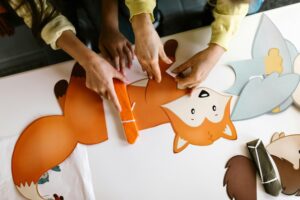As Indian parents, we all want our children to grow up confident and happy. But many of us struggle with finding the right way to discipline our kids without hurting their self-esteem. Discipline is important to teach good behaviour, but it doesn’t have to be harsh or negative. In fact, when done in the right way, it can actually build your child’s confidence.
In this blog, we’ll talk about how to discipline your kids and build their self-esteem at the same time. You’ll find that with the right balance, your child will not only behave better but also feel more secure and valued.
Understanding discipline and self-esteem
Discipline isn’t just about punishment. It’s about teaching children right from wrong and helping them understand the consequences of their actions. When we talk about how to discipline your kids and build their self-esteem, we focus on positive discipline—this means guiding your child with love, patience, and clear communication.
Self-esteem is how your child feels about themselves. It’s important for their mental health, relationships, and success in life. When discipline is handled positively, it helps children feel secure, loved, and capable.
5 Strategies for Disciplining Your Child While Building Self-Esteem
- Focus on Communication:
Explain to your child why certain behaviors are not acceptable and what they should do instead. Clear communication helps them understand the rules and feel more respected, which is a key part of building their self-esteem. - Set Clear Boundaries:
Children feel safer when they know what’s expected of them. Setting clear rules and sticking to them helps them know their limits while feeling secure in your guidance. - Rewarding good behaviour:
Congratulate your child for a job well done. Rewarding positive behaviour makes them feel good about themselves and motivates them to repeat it. This is an excellent method of teaching your children self-esteem while also disciplining them. - Teach problem-solving skills:
Instead of punishing mistakes, help your child find solutions. For example, if they knock over a glass of milk, instead of scolding, teach them how to clean it up. This builds their confidence and teaches them responsibility. - Use mistakes as learning opportunities:
Mistakes are part of growing up. Turn these moments into lessons. When your child makes a mistake, calmly explain what they can do better next time. This approach helps to discipline them without damaging their self-worth.
Discipline Practices That Undermine Self-Esteem
Some common discipline practices, like yelling or harsh punishment, can hurt your child’s self-esteem. These methods make children feel bad about themselves instead of learning from their mistakes. Instead, focus on being calm and consistent when correcting behaviour. This way, you can still set boundaries while showing your child that they are loved and valued.
When thinking about how to discipline your kids and build their self-esteem, always remember that your child’s feelings matter just as much as teaching them good behaviour.
Age-appropriate discipline techniques
As your child grows, the way you discipline them should change too. Toddlers may need simpler rules and more patience, while older children can handle more responsibility. Adjusting your approach to suit your child’s age is key to making sure the discipline is effective and still supports their self-esteem.
For toddlers, gentle reminders and redirection work well. For school-aged children, setting clear rules and discussing the reasons behind them helps them learn to manage their own behaviour.
Building a Positive Parent-Child Relationship
Discipline should always come with love and support. A strong bond between you and your child makes them feel safe, even when they make mistakes. Spend time with your child, listen to their feelings, and show affection regularly. This positive connection makes your discipline more effective and builds their self-esteem naturally.
When you focus on how to discipline your kids and build their self-esteem, you’re not just teaching them to follow rules but also helping them grow into confident, well-adjusted individuals.
Conclusion:
Disciplining your kids while building their self-esteem is possible, and it’s all about balance. With positive discipline, clear communication, and love, you can guide your child’s behaviour while ensuring they feel good about themselves. Remember, every moment of discipline is a chance to help your child grow into a confident, kind, and responsible person.
So the next time you need to discipline your child, keep these tips in mind and watch them blossom with self-confidence. With patience and care, how to discipline your kids and build their self-esteem becomes an achievable goal that benefits your entire family.
FAQs :
1. How can I discipline my kids without hurting their self-esteem?
Discipline doesn’t have to be harsh to be effective. Focus on positive discipline by setting clear boundaries, explaining the reasons for rules, and using mistakes as teaching moments. It’s all about guiding your kids with love and respect while helping them learn from their actions.
2. Can discipline and self-esteem really go hand in hand?
Yes, they can! When done thoughtfully, discipline can actually build your child’s self-esteem. By providing structure and encouraging good behaviour, you help your child feel more confident in their ability to make good choices.
3. What if my child’s self-esteem seems low despite my best efforts?
It’s natural to worry, but self-esteem takes time to build. Keep reinforcing positive behaviour, offer praise for their efforts, and provide a safe environment where they feel valued and loved. Gradually, their confidence will grow.
4. How do I handle situations when I lose my patience?
We all have moments when patience runs thin. When this happens, take a deep breath, step away if necessary, and try to respond calmly. Apologise if needed and explain why you felt upset. This also teaches your child the value of owning mistakes and rebuilding trust.
5. What role does praise play in building self-esteem during discipline?
Praise is a powerful tool! Whenever your child behaves well or makes a positive choice, acknowledge their effort. This reinforces their sense of accomplishment and helps them feel proud of themselves, which is key to healthy self-esteem.




